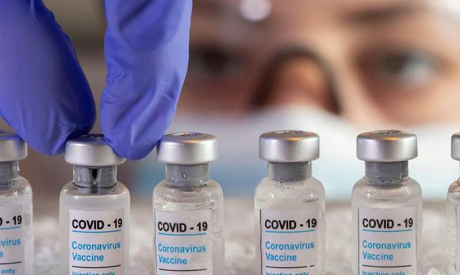
File photo: A woman holding vials labelled "coronavirus vaccine" (Reuters)
With a passport, a visa, or an airline ticket, those who wish to travel will be able to immediately receive the coronavirus vaccine and QR code certificates through soon-to-be operating international vaccination centres, Head of the Egyptian health ministry's Preventive Medicine Department Mohamed Abdel-Fattah said on Tuesday.
179 international vaccination centres nationwide will be inaugurated within a week to 10 days and will be dedicated to vaccinations and their certificates for those who wish to travel, Abdel-Fattah said during a phone-in with ONTV satellite channel on Tuesday night.
Those wishing to travel have been suffering from multiple procedures for obtaining a vaccination certificate from the Ministry of Health, documenting it from the Ministry of Foreign Affairs, and translating it at the embassy of the country to which they intend to travel.
Once they are open, Abdel-Fattah indicated, the international vaccination centres would cut short all the procedures as the travellers would be able to get the vaccine and for the first time acquire an authentic secure QR code that is easily verifiable at airports worldwide instead of a certificate that needs to be documented and translated.
Given that various countries around the world have not yet approved the Chinese vaccines — even though they have been approved by the WHO — Abdel-Fattah noted that the traveller would receive one of the vaccines authorised in their destination country.
Egypt, which started its vaccination campaign early this year, has imported millions of doses of the WHO-approved British AstraZeneca vaccine, the Chinese Sinopharm, and the Russian Sputnik V — which hasn’t been approved by the WHO.
Given that a majority of countries have not approved China’s two vaccines as of yet, the majority of travellers are choosing to be inoculated with the AstraZeneca vaccine, leading to its shortage.
“The still not recognised vaccines, especially the Chinese ones, will soon be within the loop. It is all about politics,” Islam Anan, an epidemics specialist and a pharmaeconomics lecturer at Misr International University, told Ahram Online.
The US Food and Drug Administration (FDA) has yet to approve the Chinese vaccine, which means that countries that have traditionally depended on the FDA’s lead are also delaying approval, Anan explains. But the delays, he argues, have nothing to do with the effectiveness of the vaccine. What they do mean, however, is that Egypt needs to continue importing vaccines for those who wish to travel.
According to statements of health ministry’s officials, Egypt will receive shipments of millions of doses of the Johnson & Johnson and Pfizer vaccines in the coming days.
On 26 July, the WHO reported that 5.3 million doses had been administered in Egypt, which has a population of 102 million.
Egypt’s tally of coronavirus cases has so far reached 284,090 infections, including 16,498 deaths and 228,624 recoveries.
Short link: